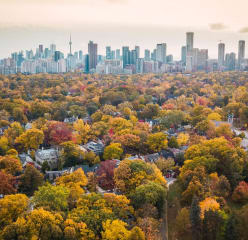Everything you should know before moving to Toronto
Make a smooth transition to Canada with these helpful tips and tricks.

Toronto, nicknamed “The Six,” is a vibrant city on Lake Ontario’s northern shore. As the largest city in Canada and the fourth-largest in North America, it’s a hub for finance, arts, and culture. For expats, moving to Toronto offers a wealth of opportunities and experiences. This comprehensive guide will cover everything you need to know about relocating to Toronto: housing, employment, education, healthcare, and more.
Hello, Toronto!

Toronto is the capital of the province of Ontario and a major Canadian city known for its high quality of life, safety, and diversity. The city is home to over 2.9 million people, with a metropolitan population exceeding 6 million. It is often ranked among the world’s most livable cities due to its excellent public services, vibrant cultural scene, and robust economy.
A multicultural melting pot
One of the most striking features of Toronto is its cultural diversity. The city is a melting pot of different cultures, with over 50% of its population being foreign-born. This diversity is reflected in the city’s neighborhoods, restaurants, festivals, and daily life. In other words, Toronto is a welcoming spot for expats from all over the world.
Climate
Expect a humid continental climate in Toronto. Winters can be cold, with temperatures often dropping below freezing, while summers are warm and humid. Spring and fall are generally mild and pleasant. Understanding the climate is essential for expats to prepare for life in Toronto, particularly if you’re moving from a country with a different climate.
Finding accommodation in Toronto

One of the first challenges expats face when moving to Toronto is where to live. The city’s housing market can be competitive, but with the right approach and information, you can find a place that meets your needs and budget.
Types of housing
Toronto offers a variety of housing options, ranging from high-rise apartments and condos to detached houses and townhomes. The type of housing you choose will depend on your budget, family size, and lifestyle preferences.
- Apartments & condos: These are popular among young professionals and expats who prefer urban living. Many come with amenities like gyms, pools, and security. Blueground’s fully furnished apartments in Toronto simplify your move. Just show up and start living!
- Detached houses: Ideal for families, these homes offer more space and privacy. They are typically found in suburban areas, though some are available within the city.
- Townhomes: A middle ground between apartments and detached houses, townhomes offer multiple floors and shared walls with neighbors.

Popular neighborhoods for expats
- Downtown Toronto: Ideal for those who want to be close to work and entertainment, neighborhoods like the Financial District, Entertainment District, and Queen West are popular.
- Midtown: Areas like Yonge and Eglinton offer a mix of residential and commercial spaces, with good schools and family-friendly amenities.
- Suburban areas: Etobicoke, Scarborough, and North York offer more affordable housing options and are ideal for families looking for larger homes.
Rental process
Renting in Toronto typically involves signing a lease. A one-year term is typical, but furnished housing providers like Blueground offer flexible options, so you can stay for a shorter or longer time. Prospective tenants will need to provide proof of income, references, and sometimes a credit check. Rental prices vary depending on the neighborhood and type of accommodation, with downtown areas being more expensive.
Buying property
For expats planning to stay long-term, buying property might be an option. Toronto’s real estate market is known for its high prices, especially downtown. Your best bet is to work with a real estate agent who understands the local market and can guide you through the buying process.
Employment & work culture

Toronto is Canada’s economic powerhouse, with a diverse economy that offers opportunities across various sectors. Whether you’re a skilled professional, an entrepreneur, or someone looking to start a new career, Toronto has something to offer.
Job market overview
Toronto’s job market is robust, with significant opportunities in finance, technology, healthcare, education, and creative industries. The city is home to the Toronto Stock Exchange and many major Canadian banks, making it a key financial center. Additionally, Toronto has a thriving tech scene, with many startups and established tech companies operating in the city.
Job search tips
- Networking: Networking is crucial in Toronto’s job market. Attend industry events, join professional organizations, and use LinkedIn to connect with professionals in your field.
- Job portals: Websites like Indeed, Monster, and Glassdoor are popular for job hunting. Additionally, specialized websites like Workopolis and TalentEgg cater to specific industries.
- Recruitment agencies: Working with a recruitment agency can also be helpful, especially if you’re new to the city and need guidance on the job market.
Work culture
Canadian work culture is generally known for its emphasis on work-life balance, inclusivity, and teamwork. Punctuality is important, and employees are expected to be professional and courteous. Toronto’s multicultural environment also means that workplaces are often diverse and inclusive, with a strong emphasis on equality and respect.
Work permits & visas
Expats moving to Toronto for work will need to ensure they have the correct work permit or visa. Canada offers various types of work permits, including employer-specific permits and open work permits, depending on your situation. It’s advisable to consult with an immigration lawyer or a licensed immigration consultant to navigate the visa process.
Education & schools

For expats moving with children, Toronto offers a wide range of educational options, from public and private schools to international institutions. The city’s education system is well-regarded, with a strong focus on quality and inclusivity.
Public schools
Toronto’s public schools are managed by the Toronto District School Board (TDSB) and the Toronto Catholic District School Board (TCDSB). Public schools are funded by the government and are free for residents, including expats with the appropriate visa status. The curriculum is standardized, and schools are known for their diversity and inclusivity.
Private & international schools
Toronto has numerous private schools, which charge tuition fees and often offer specialized curricula or smaller class sizes. Some private schools also follow religious or alternative education philosophies. For expats looking for an international curriculum, Toronto has several international schools that offer the International Baccalaureate (IB) or other globally recognized programs.
Higher education
Toronto is home to several prestigious universities and colleges, including the University of Toronto, Ryerson University, and York University. These institutions attract students from all over the world and offer a wide range of undergraduate, graduate, and professional programs.
Healthcare in Toronto

Canada’s healthcare system is one of the best in the world, and as an expat living in Toronto, you’ll have access to high-quality medical care.
Health insurance
Residents of Ontario, including expats with the appropriate visa status, are eligible for the Ontario Health Insurance Plan (OHIP). This government-funded plan covers a wide range of healthcare services, including doctor visits, hospital stays, and medical procedures. To qualify for OHIP, you must apply and meet certain residency requirements.
Finding a doctor
Toronto has a large network of family doctors and specialists. Once you’re covered by OHIP, you can register with a family doctor who will be your primary healthcare provider. You can find doctors through the Health Care Connect program or by asking for recommendations from friends or colleagues.
Hospitals & clinics
Toronto is home to several world-class hospitals, including Toronto General Hospital, Mount Sinai Hospital, and The Hospital for Sick Children. These institutions offer specialized care and emergency services. In addition to hospitals, there are numerous walk-in clinics and urgent care centers throughout the city.
Transportation in Toronto

Toronto has an extensive public transportation system, making it easy to navigate the city without a car. Whether you prefer taking the subway, riding a bike, or driving, Toronto offers a variety of options.
Public transportation
The Toronto Transit Commission (TTC) operates the city’s public transportation system, which includes subways, buses, and streetcars. The subway is the fastest way to travel around the city, with four lines covering key areas. Buses and streetcars complement the subway, providing access to neighborhoods not served by the subway lines.
- Fare System: The TTC uses a Presto card system, which allows for easy payment and transfers across different modes of transport.
- GO Transit: For those commuting to the suburbs or neighboring cities, GO Transit offers train and bus services that connect Toronto with the Greater Toronto Area (GTA) and beyond.
Cycling
Toronto is becoming an increasingly bike-friendly global city, with dedicated bike lanes and bike-sharing programs like Bike Share Toronto. Cycling can be a convenient and eco-friendly way to get around, especially in the downtown core.
Driving
If you prefer driving, Toronto has a well-maintained road network, though traffic congestion can be an issue, particularly during rush hours. Parking in the city can be expensive and limited, so many residents opt to use public transportation instead. Expats can use their foreign driver’s license for a limited time, but it’s advisable to obtain an Ontario driver’s license if you plan to stay long-term.
Cost of living

Toronto is known for its high cost of living, particularly when it comes to housing. However, the city’s diverse economy and high wages often offset these costs, making it possible to maintain a good standard of living.
Housing costs
Housing is the most significant expense for most residents. Renting a one-bedroom Toronto apartment in the city center can cost CAD 2,000 or more per month, while prices decrease slightly in the suburbs. If you’re planning to buy a home in Toronto, the average price can exceed CAD 1 million, though this varies depending on the neighborhood.
Utilities & internet
Monthly utility costs, including electricity, heating, cooling, and water, typically range between CAD 150 and CAD 250. High-speed internet services cost around CAD 50 to CAD 100 per month, depending on the provider and plan.
Groceries & dining out
Grocery prices in Toronto are generally higher than the national average. A typical monthly grocery bill for a single person ranges from CAD 300 to CAD 500, depending on shopping habits. Dining out in Toronto can also be expensive. However, the eclectic restaurant scene provides a range of flavors to try out during your time there.
Ready, set, Toronto!

We hope this guide has helped you prepare for moving to Toronto. Looking for a place to stay while you live in Canada’s largest city? Blueground offers fully furnished homes and flexible terms. Our move-in-ready apartments also feature exclusive furnishings, fully equipped kitchens, and incredible amenities. Plus, you’ll enjoy high-speed Wi-Fi, premium linens, smart home entertainment, and reliable support.






